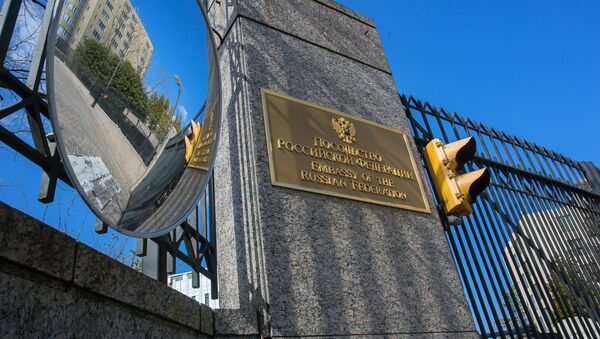On Monday, the US charged six alleged Russian military intelligence officers with a major cyber attack, claiming that they targeted large-scale events, such as elections in France, Ukraine's power grid and American medical facilities.
"It is quite obvious that such information has nothing to do with reality and is aimed only at stirring up Russophobic sentiments in the American society, at launching a 'witch hunt' and spy mania. All this has been a distinctive feature of Washington's political life for several years now. The US authorities are consistently destroying the once pragmatic Russian-American relations and artificially imposing a toxic perception of Russia and everything connected with it on their population," a Russian embassy representative told Sputnik.
The representative of the embassy in Washington added that "Russia does not and has not had any intention of engaging in any kind of destabilizing operations around the world. This is not in line with our foreign policy, national interests, as well as our understanding of how relations between states are built. Russia respects the sovereignty of other countries and does not interfere in their affairs."
The Russian embassy in Canada has also dismissed all allegations concerning Russia’s alleged cyber activity, calling them "absurd and baseless."
Global Affairs Canada and the Communications Security Establishment issued a statement on Monday saying that "Canada is concerned over reports of a series of global malicious cyber activities, as detailed in today’s statements by the United States and the United Kingdom." According to the release, the activities "are examples of the willingness of Russian military intelligence, GRU, to target critical infrastructure and international organizations."
The Russian embassy in Canada said on Twitter on Monday that Ottawa was damaging its relations with Moscow by issuing such groundless statements.
"Another absurd and baseless Canada allegations on Russian 'malicious cyber activity' copycat US-UK intelligence disinformation as part of psychological war against Russia. Ottawa is further damaging Canadian-Russian relations following its Russophobic narrative," the embassy said.
According to the indictment, unveiled on Monday, six alleged Russian military intelligence officers have used "the world’s most destructive malware to date," including NotPetya, which wreaked havoc globally and caused nearly $1 billion in losses to victims identified during the probe.
US authorities alleged that in December of 2015 and 2016, the conspirators launched destructive malware attacks against the electric power grid in Ukraine. In the US, hospitals in Pennsylvania were allegedly attacked with malware. US authorities claimed that the suspects also tried to undermine the PyeongChang Winter Olympics, and attempted to meddle in elections in France, as well as tried to compromise the Georgian parliament network and a major media company in the post-Soviet Republic. The group also allegedly conducted "spearphishing campaigns" against investigations by the Organisation for the Prohibition of Chemical Weapons and the United Kingdom’s Defence Science and Technology Laboratory into the Novichok nerve agent poisoning of former spy Sergei Skripal and his daughter, according to the indictment.
A source at the Russian Foreign Ministry told Sputnik on Monday that the accusations are groundless, aim to create anti-Russian sentiments, and are addressed to the internal audience within the context of the upcoming presidential election in the United States.


